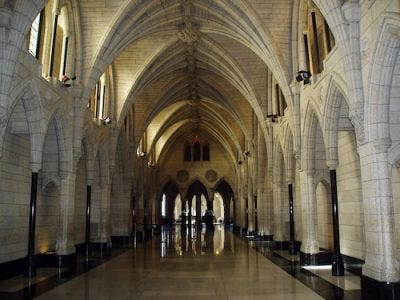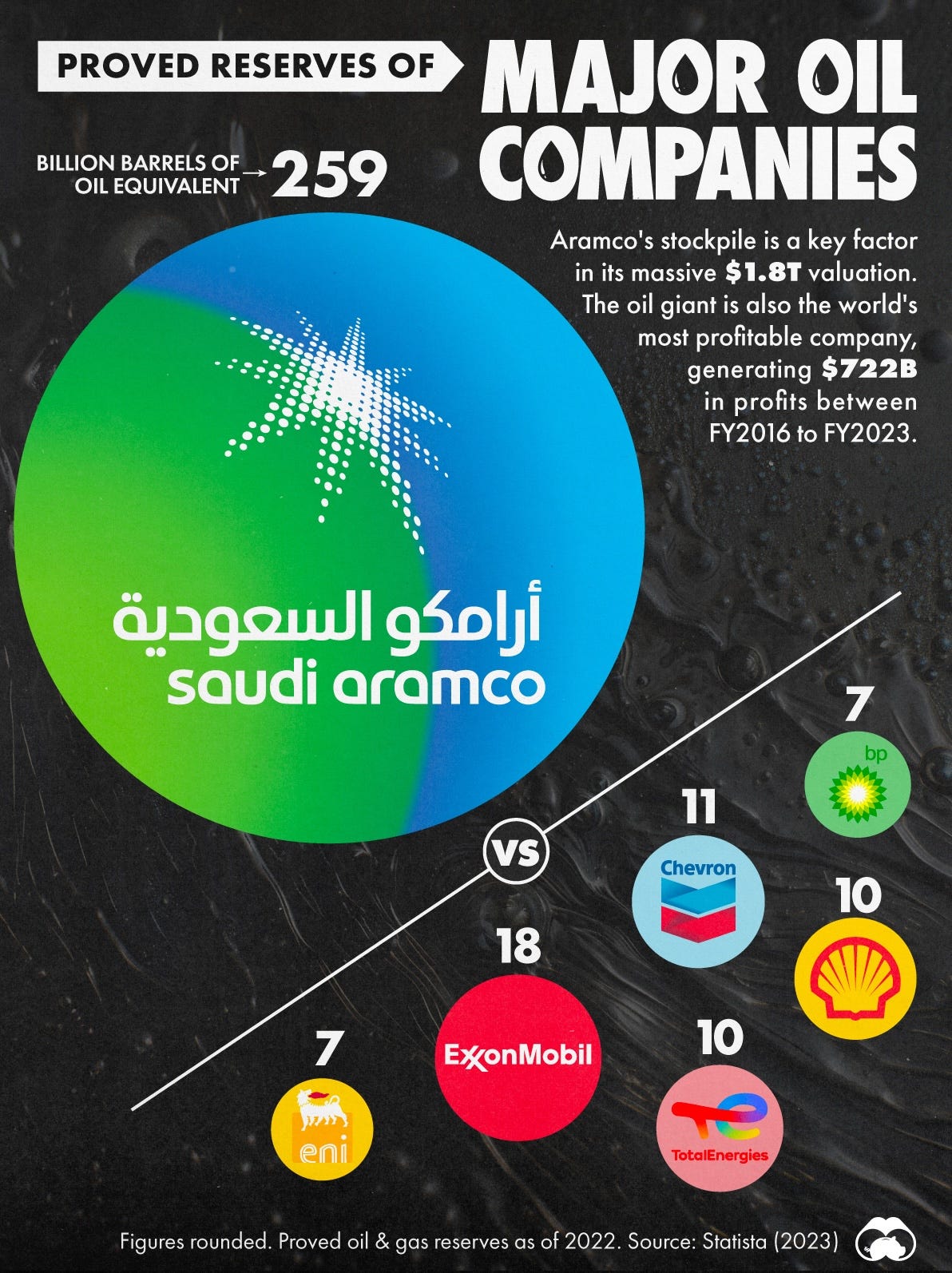Is That All There Is? Ottawa Loses the Thread on Two Big Climate Promises
If this is the best climate policy we can hope for, is it any wonder people have stopped expecting governments to deliver? It’s time to break through the polarization and political paralysis.
BREAKING: This edition of The Energy Mix Weekender was almost ready to publish when news broke that President Joe Biden is ending his re-election bid. Along with everything else this sets in motion—from a fundamental shift in dynamics in the U.S. campaign, to the realistic hope that his administration’s climate policies and investments will survive and expand—this is Biden’s reluctant but courageous, deeply painful but deeply statesmanlike answer to this week’s question: Is That All There Is? For himself, his family, his country, and all the rest of us.
It’s been a disappointing week for anyone looking to the Canadian government for smart, ambitious decisions that will confront a devastating affordability crisis while reducing carbon pollution and boosting our resilience against the impacts of climate change.
On Tuesday, Natural Resources Minister Jonathan Wilkinson announced a long-awaited Green Buildings Strategy that includes $800 million for energy retrofits in low-income households and a pledge to replace oil heating with heat pumps in new buildings. But the strategy is mostly a rehash of actions the government had already announced. It’s underfunded for what it’s meant to achieve. It presents no clear vision of what a net-zero building stock would look like, and no new federal investments or toughened performance standards that would get builders onboard with a national retrofit mission.
Then on Wednesday, Housing, Infrastructures and Communities Canada unveiled the grandparent of all good news/bad news announcements. A new Canada Public Transit Fund will pour $30 billion over 10 years into new vehicles and infrastructure, beginning in 2026, but with no response to the massive gap in operating funds that is hamstringing local transit agencies across the country.
Leave aside that both of these big reveals come late enough in the federal government’s mandate—and close enough to the next election—that most if not all the actual funding will depend on a future government (of any political stripe…making no predictions here) keeping this week’s promises over the longer haul.
The bigger disappointment is that both of these decisions have been in the works for years, not months, and this is as far as the government has been able or willing to carry them. Wilkinson’s December 16, 2021 mandate letter from Prime Minister Justin Trudeau instructs him “to develop and implement a National Net-Zero Emissions Building Strategy”. The PM’s letter to then-Infrastructure Minister Dominic LeBlanc calls for his department to “leverage our government’s investments in public transit and infrastructure to support a cleaner, greener and more prosperous future”.
In both cases, we’re left with small, incremental steps in the right direction when we needed big, bold, well-funded leaps to solve real problems, make genuine progress, and begin restoring Canadians’ faith that this government, or any government at all, is actually working for us.
A Feature or a Bug?
Against the backdrop of some of the government’s other recent work, the cautious, limited announcements we saw last week look like signs a deliberate strategy, not isolated incidents. Like a feature, not a bug.
It spent a lot of time working on a sustainable jobs strategy that produced no actual, direct jobs.
It delivered a much watered-down update to the federal Impact Assessment Act that went much farther than it had to after Alberta successfully challenged the existing legislation before the Supreme Court.
Ottawa’s green taxonomy is coming up next, an opportunity to either encourage or slow down the financial policy and investments at the heart of any effort to speed up decarbonization and phase out fossil fuels. This deal isn’t quite done yet, but advocates aren’t optimistic.
Investors for Paris Compliance says the taxonomy could either be a win or a “train wreck”. But it looks likely that the final text from Finance Minister Chrystia Freeland’s office will extend a free pass to deeply unsteady carbon capture and storage technology and dangerous and needless expansions of Canada’s natural gas networks.
It was almost as though the last week of rising floodwaters in Toronto and raging wildfires in British Columbia, Alberta, and Labrador were a metaphor for the political firestorm consuming the federal Liberals as they grapple with a daily barrage of evidence-free polarization, a 20-point deficit in national polling, and a leader who’s clearly past his best before date. The crisis has hit. It’s big and overwhelming. We think we’re responding as best we can. But it isn’t enough, and the hits just keep on coming.
The Peggy Lee Prediction
Which brings us to a hit of a different kind, a tune that sums up all too well what’s going on today in national climate policy. It’s almost beginning to sound like American singer/songwriter Peggy Lee, who died in 2002, is somehow alive, well, and spending too much of her valuable time in federal cabinet meetings.
Lee recorded her song That’s All There Is in 1969, with a chorus that (depending on your interpretation) either abandons all hope for anything that matters, or encourages her listeners to persist and never let up, no matter how desperate or unlikely the odds may seem.
Is that all there is, is that all there is
If that's all there is my friends, then let's keep dancing
Let's break out the booze and have a ball
If that's all there is.
There’s actually a Peggy Lee forum where people discuss the deeper meaning behind the song, much of it turning on the word “if”: Lee isn’t giving up hope, the optimists say, but urging her listeners to keep up the fight for more and better.
Without reading too much into a song that was written in the first year of Trudeau’s dad’s first term of office, before our current PM was born…it’s a bit uncanny how Lee hit some of the metaphorical markers that we worry about today.
A house on fire and watching “the whole world go up in flames”.
A circus billed as the “greatest show on Earth” that fails to live up to its billing, not unlike any government trying to keep its promises in a time of political polarization and paralysis.
I expect the only thing I’m proving here is that I should stay in my lane and stop trying to interpret music. But the most obvious conclusion from Lee’s lyrics—“let’s break out the booze and have a ball” (and maybe update that 55-year-old phrasing while we’re at it)—is exactly the tone of resignation that we don’t want and can’t afford in our response to climate change.
That mounting public despair is the clearest proof of failure in any policy that produces it, whether it’s a buildings or transit announcement from a sitting government or a pair of private member’s bills from an opposition politician who knows they haven’t a hope of being adopted. Largely because his own party’s rejection of coalition politics contributed to a vote split that delivered 83 of the 124 seats in the Ontario legislature to a government with a six-year history of hostility to emission reductions and the energy transition, backed by just 17.76% of eligible voters.
But Wait. There’s More!
But what if this isn’t all there is?
Many of us—maybe too many of us, too often—have accepted over the last few years that the best climate policy we can get is bound to be incremental, can only move at the pace of public perception and confidence. That’s still true, to the extent that no community and no region of the country should be dismissed or left behind as we work to drive down emissions and shift our energy systems.
The ceaseless, deliberate obfuscation and misinformation from the fossil fuel lobby and its political backers have made the picture a whole lot more complicated than it needed to be. But even so, the assumption behind a more incremental approach has always been that the plan will keep getting better, bolder, more ambitious over time. That we still plan to deliver on the urgency and the promise of a net-zero future, a fossil fuel phaseout, and a thriving green economy.
If that’s no longer where we’re headed—if this really is all there is—then we need a new plan.
Thankfully, the broad lines of that plan are coming into view.
We knew early on that 2024 would be make or break time for climate action around the world, with an estimated 4.2 billion people in more than 50 countries eligible to vote in national elections. The fear was that, with right wing populism on the rise, the year would bring massive setbacks for climate, human rights, and democracy.
We won’t have the whole story until Americans go to the polls in November. (And today’s White House news could bring a 180° shift in that vote.) But in many of the elections we’ve seen so far, things aren’t going so poorly.
Laurence Tubiana For The Win
Most notable, and most instructive for countries like Canada, was the election that wrapped up a couple of weeks ago in France. In the first round of voting in June, Marine Le Pen’s National Rally party won an alarming one-third of the vote, prompting fears that the march of far-right populism would be unstoppable in the second and final round July 7.
But then, something remarkable and remarkably mature happened—on a par, come to think of it, with Biden putting his country ahead of his own political interests with today’s decision to withdraw. After absorbing the first round of results, 224 eligible candidates in three- and four-way contests—224 of them!—ended their campaigns to avoid splitting what amounted to the anti-fascist vote.
When the dust had settled on the second round of voting, a coalition of four left-leaning parties held the largest number of seats in the National Assembly. And Laurence Tubiana, the veteran climate diplomat and co-architect of the Paris agreement who now heads the European Climate Foundation, was in contention to be named France’s next prime minister.
This is what happens when democracy works. When politics can flex, adapt, and listen to the large majority of voters who want action on affordability, food prices, housing, health care, opioids, climate change, the energy transition, and so many other day-to-day urgencies where solid, practical solutions are blocked by political rhetoric and gamesmanship.
It may be a while before Canadian politicians and their advisors get the memo on what seems to be unfolding elsewhere. But several commentators have taken note, and at least one of them has come up with an interesting call to action.
On The Orchard this week, Jeremy Appel challenges the federal Liberals, New Democrats, Greens, and Bloc Québécois to apply the lesson from France by forming “a one-time united front with the goal of immediately introducing proportional representation if elected.”
Unlike France, Appel notes, Canada won’t have the luxury of a two-part vote to give politicians the lay of the land before they decide their strategy. “They’ve got one shot, and the sooner they communicate their intention to voters, the more difficult it will be for [opposition leader Pierre] Poilievre to accuse them of subverting democracy by entering an arrangement to ensure majority rule.”
But the point of the exercise, Appel stresses, would not be to hold power, but to hand it back to the rest of us.
“This progressive alliance must immediately resurrect Prime Minister Justin Trudeau’s broken promise to implement electoral reform, with some variation of proportional representation to ensure that the next government, whatever its political stripe, governs with the consent of the majority of voters,” he writes.
“If they win, there’s no need for a complex and costly referendum. That’s what the election was for.”
No voting system delivers perfect policy. But the recent results in both France and the European Union show how a more mature approach to electoral politics can avert the kind of extreme mood swings we see in both Canada and the United States, where every campaign runs the risk of burning a country’s climate policies to the ground.
Along the way, it might even deliver governments that feel they have the political mandate to produce real policy, rather than the embarrassingly pale imitations we’ve been seeing from a late-stage federal government putting damage control ahead of real progress.
Mitchell Beer traces his background in renewable energy and energy efficiency back to 1977, in climate change to 1997. Now he and the rest of the Energy Mix team scan 1,200 news headlines a week to pull together The Energy Mix, The Energy Mix Weekender, and our weekly feature digests, Cities & Communities and Heat & Power.
Chart of the Week
Oil Consumption to Peak Next Year, Still Drive Warming Above 2°C, BP Says
Ford Ditches $1.8B EV Plan at Oakville Assembly Plant
California Microgrids Test Long-Duration Energy Storage
In Hydrogen Aviation, One Startup Nosedives While Another Wins Promising Boost
Strathcona, Canada Growth Fund Ink $2B Carbon Capture Deal
EverWind Unveils Canada’s Biggest Wind Farm as Locals Pan Hydrogen Export Plans
Low-Income Retrofit Funds, No Firm Net-Zero Targets in Long-Awaited Green Buildings Strategy
Canadians ‘Disengaged’ on Climate Respond to Affordability, Fairness Issues
Energy Experts Applaud as B.C. Pushes to Restore Transmission Link with Alberta
'We can't wait another year': disaster-hit nations call for climate aid (France 24)
Nuclear too slow to replace coal, and baseload ‘simply can’t compete’ with wind and solar (RenewEconomy)
Taliban tries reconciling science and religion in facing climate change (Washington Post)
The Republican climate plan is...way worse than the Taliban's? (Bill McKibben/The Crucial Years)
HSBC Launches Climate-Focused Infrastructure Finance Unit (DawnDigest)
50 Years of Consistent Oil and Gas Advocacy Against Renewables and Electric Vehicles (Influence Map)
Volatile Costs of Fossil Fuel Energy were a Key Driver of Recent Record Inflation and Continue to Impact Affordability (International Institute for Sustainable Development)
‘Significant shift’ away from coal as most new steelmaking is now electric (Carbon Brief)
EU must review 'overly ambitious' H2 targets: Audit (Argus Media)
EU walks back on aviation climate law and excludes long-haul flights (Transport & Environment)
New U.S. solar industry standards aim to combat unethical ‘solar bros’ (Renewable Energy World)








